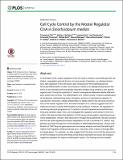Cell Cycle Control by the Master Regulator CtrA in Sinorhizobium meliloti
Author(s)
Pini, Francesco; De Nisco, Nicole J.; Ferri, Lorenzo; Penterman, Jon; Fioravanti, Antonella; Brilli, Matteo; Mengoni, Alessio; Bazzicalupo, Marco; Viollier, Patrick H.; Walker, Graham C.; Biondi, Emanuele G.; ... Show more Show less
DownloadPini-2015-Cell Cycle Control b.pdf (4.164Mb)
PUBLISHER_CC
Publisher with Creative Commons License
Creative Commons Attribution
Terms of use
Metadata
Show full item recordAbstract
In all domains of life, proper regulation of the cell cycle is critical to coordinate genome replication, segregation and cell division. In some groups of bacteria, e.g. Alphaproteobacteria, tight regulation of the cell cycle is also necessary for the morphological and functional differentiation of cells. Sinorhizobium meliloti is an alphaproteobacterium that forms an economically and ecologically important nitrogen-fixing symbiosis with specific legume hosts. During this symbiosis S. meliloti undergoes an elaborate cellular differentiation within host root cells. The differentiation of S. meliloti results in massive amplification of the genome, cell branching and/or elongation, and loss of reproductive capacity. In Caulobacter crescentus, cellular differentiation is tightly linked to the cell cycle via the activity of the master regulator CtrA, and recent research in S. meliloti suggests that CtrA might also be key to cellular differentiation during symbiosis. However, the regulatory circuit driving cell cycle progression in S. meliloti is not well characterized in both the free-living and symbiotic state. Here, we investigated the regulation and function of CtrA in S. meliloti. We demonstrated that depletion of CtrA cause cell elongation, branching and genome amplification, similar to that observed in nitrogen-fixing bacteroids. We also showed that the cell cycle regulated proteolytic degradation of CtrA is essential in S. meliloti, suggesting a possible mechanism of CtrA depletion in differentiated bacteroids. Using a combination of ChIP-Seq and gene expression microarray analysis we found that although S. meliloti CtrA regulates similar processes as C. crescentus CtrA, it does so through different target genes. For example, our data suggest that CtrA does not control the expression of the Fts complex to control the timing of cell division during the cell cycle, but instead it negatively regulates the septum-inhibiting Min system. Our findings provide valuable insight into how highly conserved genetic networks can evolve, possibly to fit the diverse lifestyles of different bacteria.
Date issued
2015-05Department
Massachusetts Institute of Technology. Department of BiologyJournal
PLOS Genetics
Publisher
Public Library of Science
Citation
Pini, Francesco, Nicole J. De Nisco, Lorenzo Ferri, Jon Penterman, Antonella Fioravanti, Matteo Brilli, Alessio Mengoni, et al. “Cell Cycle Control by the Master Regulator CtrA in Sinorhizobium Meliloti.” Edited by Josep Casadesús. PLoS Genet 11, no. 5 (May 15, 2015): e1005232.
Version: Final published version
ISSN
1553-7404
1553-7390